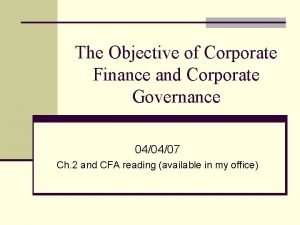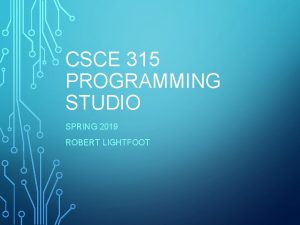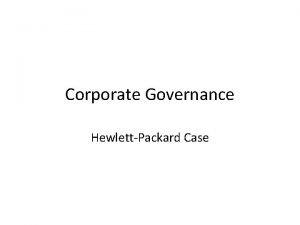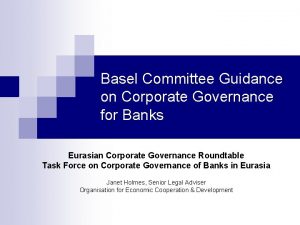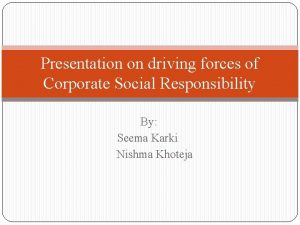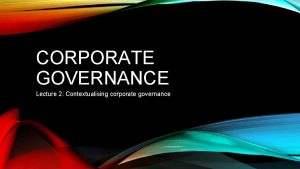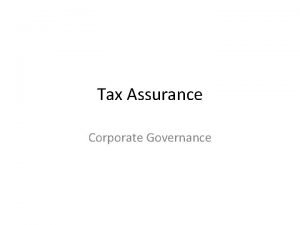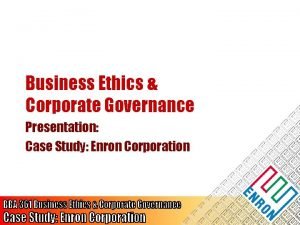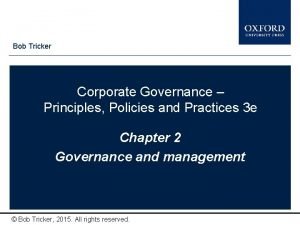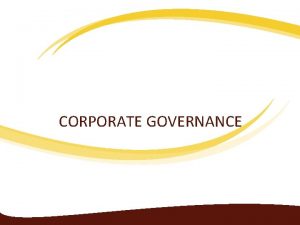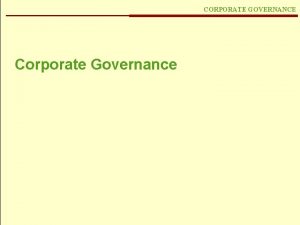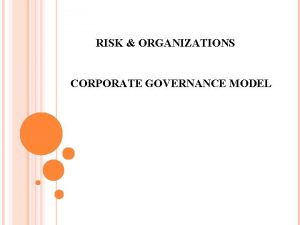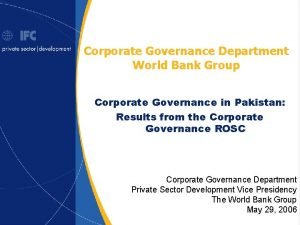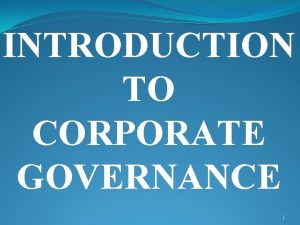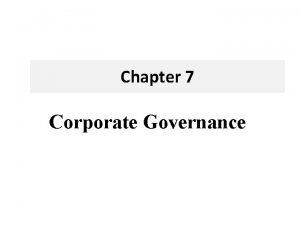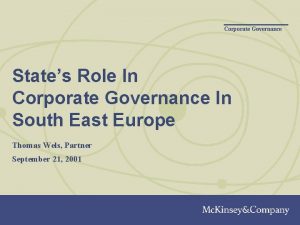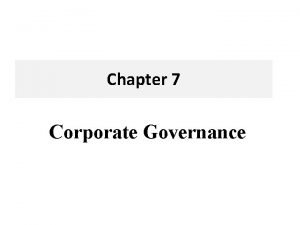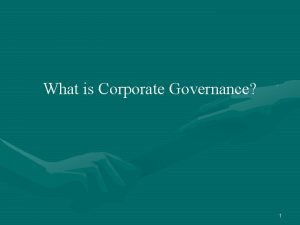Corporate Governance Dr Geoffrey Lightfoot Some theoretical themes















- Slides: 15

Corporate Governance Dr. Geoffrey Lightfoot

Some theoretical themes • Agency Theory • Simple version of accountability • Easy to model • Stakeholder accountability • Stewardship • ‘Business case’ or ethical demands?

Agency Theory • Part of the revolution in corporate finance • Finance moves from more discursive to more econometric • Allied to Shareholder Value Movement • Runs alongside political developments • Neo-liberal, neo-conservative belief in markets, rather than the state as organizing principal • Chicago School economics (such as Friedman) • Margaret Thatcher and Ronald Reagan • Individual responsibility… • Ross (1973) and Jensen & Meckling (1976) are key sources in Finance

A digression - Jensen in his own words • After the seminar, and this is seared in my memory, we silently walked out of the room and up to Bill's office. He had a big desk, and he smoked these big black cigars. Bill sat down behind the desk, and I sat on the other side in a couch. He put his feet up on the desk. He pulled out this big cigar, and he lit it. Then he said, "We sure didn't sell that one, Michael. ” And I said, "We sure didn't. ” • …Later when I went to give the paper at the University of Chicago, my alma matter, with Gene Fama and Merton Miller and my old faculty members and friends who were still in the doctoral program, I got the same reaction. They hated it. They didn't just not like it. They hated it

Jensen in his own words • So, Bill and I were sitting around wondering what to do, because we thought it [a different paper] would be readily accepted. And while we were puzzling over that in a period of literally less than a week, Gene Fama, who was on leave visiting in Belgium for the year had gotten a hold of the current version of the paper, maybe through the working paper series. And he sent an unconditional letter of acceptance as editor of the JFE to publish the paper in the JFE. (Jensen 2010)

• And, what we referred to as the old finance guys, the finance professors from around the world who were running the journals and, and the profession quite understandably weren't wildly enthusiastic about this stuff. It didn't occur to them as finance. What is this stuff about regressions and all of that kind of stuff? (Jensen 2010) Compared to: • If the powerful new tools [of quantitative methods] are used as ineffectively as they seem to be [. . . ]then the future of the new finance and the finance field in general is black. [. . . ]It suggests that coming generations of business school graduates will embark on their business careers well indoctrinated in the ineffective use of quantitative methods and abysmally ignorant of finance. Is this what we really want? (Durand 1968: 852)

Agency Theory • Principal-Agent Problem • Shareholder Principal, managers as agents • Goals in conflict • Agents seek • Job security rather than company profits • Individual perks rather than company profits • Short-term benefits (high risk) rather than long-term wealth

Short-termism • Foreshortening investment decisions • Lack of investment in R&D etc. • Pressure from institutional investors • Interested in short-term profits rather than longterm gains • Is it only exposed by failure? • https: //www. theguardian. com/business/2019 /sep/29/thomas-cook-failure-incompetencenot-corporate-greed

Agency costs • Costs incurred in minimizing agency problem • Information costs • Cost of producing information (such as annual reports) • Bonding Costs • Incentive systems and contracts • Compare these to the Residual Cost of taking no action

Shareholder Activism as a solution? • Limited rights of shareholders • But even these rarely used • http: //www. theguardian. com/business/2015/jun/04/m orrisons-shareholders-protest-bonus-sacked-chiefexecutive • Divestment (selling shares) and the threat of divestment • Can have consequences if widely adopted • Essentially the plan of some environmental investment • Codes of Practice

Transaction Cost Theory • Why does a corporation exist? • Transaction costs lower than in the market • Internalization reduces risks including information asymmetry • Organizations do not act internally as markets • Manager’s as ‘opportunistic’ working under bounded rationality • ‘Bounded rationality’ – only have partial information and cannot be purely rational

Stakeholder theory • Originally coined in Strategy literature by R. Edward Freeman, “Stakeholder Theory is a view of capitalism that stresses the interconnected relationships between a business and its customers, suppliers, employees, investors, communities and others who have a stake in the organization. The theory argues that a firm should create value for all stakeholders, not just shareholders. ” • i. e. stakeholders are those who affect and are affected by the company • ‘Strong’ and ‘Weak’ definitions (more-inclusive and less-inclusive) and also related to different notions of ‘value’. • Conventional, as seen in introductory accounting texts: • Shareholders, debtors, creditors, customers, employees, government, etc. • Radical • Environment, all taxpayers, general public

Stakeholder v Agency theory • Different starting points, so different conclusions • What is the role of the corporation? • How are corporations to be evaluated? • Morally or financially? • Does a ‘business case’ approach solve the problem?

Business Case • Corporations will do what is right because it makes financial sense. • ‘Instrumental morality’ rather than ‘ethical’ decision-making within the corporation • Rests on investors and others being ethical themselves.

Questions of Accountability • Who should be held accountable under different theoretical perspectives? • And how?
 Objectives of corporate governance
Objectives of corporate governance Guy lightfoot
Guy lightfoot Gordon lightfoot ethnicity
Gordon lightfoot ethnicity Guy lightfoot
Guy lightfoot Nigel lightfoot
Nigel lightfoot Robert lightfoot tamu
Robert lightfoot tamu Cynthia lightfoot
Cynthia lightfoot Joshua lightfoot
Joshua lightfoot Hp corporate governance
Hp corporate governance Basel corporate governance
Basel corporate governance 5 driving forces of csr
5 driving forces of csr Corporate governance clause 49
Corporate governance clause 49 Corporate governance lecture
Corporate governance lecture Tax assurance
Tax assurance Case study on business ethics and corporate governance
Case study on business ethics and corporate governance Tricker model
Tricker model
